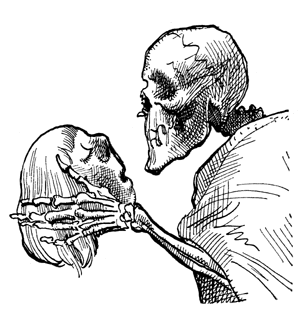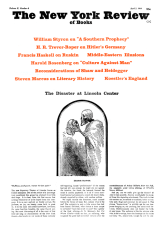“Dullness, good queen, repeats the jest again.”
The new Repertory Theater of Lincoln Center—a woeful enterprise. Out of the pocket of a patronage truly munificent this group has plucked three little dead bugs. It is clear, from this first season, that nothing whatsoever is to be hoped from this company. It is so new and yet so freshly corrupt. No gladness, no joy, no beauty come forth to greet us. It is the same old sordid know-how, lowliness; the same heartless banality, the same flaccid acting. But most distressing of all is the scent of that fetid air long so characteristic of the New York theater—the breath on our necks of those endlessly self-regarding, famed “professionals.” If the season had not left one cynical, he might cry out against the injustice, the fraud, the betrayal. Instead the mind is merely perplexed. It is as if some moribund heiress had endowed a torpid old desert sheik, already stupefied by riches, with another million.
We might recount the donations, stand amazed before the throne of hope. But, indeed, what is the use? The malignity is only a little worse than had been feared. Defeated, what choice is there except to surrender? And who is left to care? The vapidity of the final offering—S. N. Behman’s But For Whom Gharlie—think on that, ye suffering, who imagined the gods had no further tortures after the meretriciousness of Arthur Miller’s After the Fall, the miserably acted votive offering of O’Neill’s Marco Millions!
And yet, can we really give up the theater? If only it were possible. Anyone would gladly be excused from this degrading attachment. The truth is that this ancient art, so natural to mankind, holds us in a holy pact. Rage and contempt do not annul it. The phrase, “theater-lover,” is pitifully apt for our desperate hanging on, our yearning, our unreturned devotion. Disillusionment does not hinder the birth of new hopes. The audience is like the anxious wife who, in the evenings, hears the footsteps on the stairs and says, “Ah, please God, tonight he will be sober!” Tonight, tonight.
Can contemplation, desperation, yield one over-riding sin from which all the little transgressions obediently follow? The destruction of the American theater seems to have come from the fact that producers and directors and actors do not know that the drama is a branch of literature. Those who have been told so do not truly believe it—not for our time, in any case. The last decade shows that the professionals, in whose pitiless subjection this great art lives, believe drama is an arresting idea or situation, projected by mechanical, theatrical devices, and embodied finally in the movements of stage stars. From the top to the bottom of the commercial theatre this is the conviction—the only one they have. There is no sense that drama is first and last an act of literary composition. A thousand humiliations and mortifications have not taught theater people this beginning lesson. If only so and so had not acted the part, if only this nothing had been “tightened” or “quickened,” or whatever.
The people responsible for our stage do not understand literature. They are in no position to pass judgment, to make choices: their repeated failures testify, with encyclopedic fullness, to this accusation. They have a sort of root incapacity, an engulfing want of aptitude—their indifference to writing. They have no taste, no love, no tradition, and are therefore acting as assassins of the drama, which is, after all, literature written for the stage. They do not hear abominable rhetoric, they do not repulse foolish motivation, do not resent vulgar pretentiousness, fraudulent sentiment, or trite comedy. One grotesque banality after another is put before the public, put forth indeed with all that jaunty self-confidence that speaks so clearly of a man’s inner condition. These are happy, hopeful people who rush to the debacle ahead with the manic heedlessness of a business speculator, a chattering embezzler only trying to have a little fun. They do not take into account those mimeographed pages with the little black marks on them. It does not seem unfair to state, flatly, that the shocks of the first season of the Repertory Theater would have been impossible for anyone who cared for good books. Imagine—and with sympathy—the number of times these appalling scripts have been read, re-read, studied, loved, recited. A man needs a special heart for that. Few could endure it.
Consider the Actors Studio, also the ungrate ful recipient of foundation money. That organizatior gave the public the dramatic writing of June Havoc. This is a scandal. And perfectly to be expected. To the Actors Studio the drama means what it means to everyone else in the theater—a situation (here, the Marathon dances of the 1930s) and a star, Julie Harris.
Advertisement
And consider the case of one of the few geniuses of the contemporary theater, the director, Franco Zeffirelli. When Zeffirelli “revived” Romeo and Juliet and more recently Verdi’s opera, Falstaff, he took his opportunity literally: that is, he brought great works to a thrilling, new life. As we entered the theater, we felt the exaltation, the joy, the trembling air. These productions, freshly looked at by a brilliant young man, reminded us that the theater is a necessity. But even the verve and originality of Zeffirelli—something the sluggish Repertory Theater could not imagine—even that, could not save his slack adaptation, gracelessly written, of The Lady of the Camellias. This was just another of those squalid Broadway evenings, unredeemable….At the moment in New York, you cannot find a production of Under Milkwood by Dylan Thomas, but you can find a play about Thomas, written with brutal clumsiness by Sidney Michaels.
Our wordless plays have borne their children, the dull, stuttering actors. The performances on Broadway are scarcely to be believed: one unexceptional, earthbound presence after another comes before us, claiming, according to the scripts, to be beautiful, irresistible, brave, clever, or charming. To a great degree, the mute, untrained actors are the proper embodiment of inert plays. They fit into their roles with a neighborly sort of limpness. Nothing in the actor’s diction rebukes the insipid dialogue. They give no hint of enchained mysteries and beauties; rather, they appear to struggle only to be themselves without any transforming ambitions. The actors, the playwrights, the producers and directors have grown up together. They have sibling defects. We may pity them, but they are used to each other and hardly notice.
Are there any good plays in hiding? The dead tree does not encourage the new bud. And what could an original new playwright hope for except the mortifying dust of those off-Broadway closets to which we go because we must, spurred on by some lingering twitch for the theater, for The Trojan Women, or European drama. The truth is that Broadway plays, satisfying only the vanity of the authors, should be done off-Broadway and the off-Broadway plays should be taken to the real stage, where they deserve the richness, the luxury, the shimmering light of extravagant presentations.
But, again, are there any good new plays in America? It seems likely that they are few. For a long time serious people have found the American theater of little interest. Illiterate professionalism has succeeded in convincing itself, its greedy investors, its hasty benefactors, that it is the guardian of something called a “good play” and that one must learn from these guardians how the miracle is created. In this way the literary dignity and possibility of the theater have been annihilated. But for Whom Charlie is a “well-written play” in exactly the same way a soap opera, which it strongly resembles in language and philistine attitude, is “well-written.” That means it is a fatuous contrivance, doled out in carefully measured bits. Perhaps a humble play is a necessity in a theater that has given the secondary arts—directing, acting, staging—complete command. It would not do to take away the importance the artisans have reserved for themselves alone.
Do not take hope. Except for a handful, everyone in today’s theater is a menace of one kind or another. A salvation that would need to cut down so many cannot even be desired without guilt. The gods, parceling out their gifts, clearly do not mean for America to be purged of pity and terror by drama. For that, destiny has sent us TV.
This Issue
April 2, 1964




